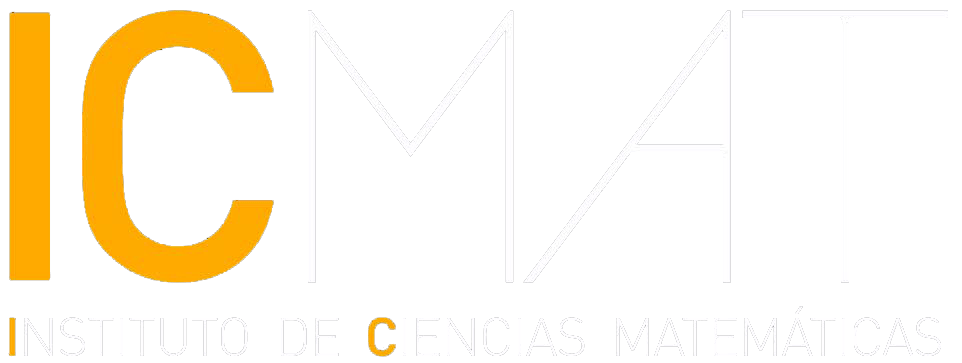The activities of the ICMAT Week of Science and Technology are organized in collaboration with the Spanish National Research Council (CSIC) , the Alcobendas Council and IES Beatriz Galindo. They also have financing Spanish Foundation for Science and Technology (FECYT) .
Science Week 2015
CONFERENCE: What we know and what we don’t know about mathematics and what it has to do with physics.
Speaker: Alberto Enciso (CSIC-ICMAT).
Summary:
In this talk, Alberto Enciso (CSIC/ICMAT) will explain how current mathematics is developed starting from physics problems that are studied at a baccalaureat level. This will help to explore the aims and ideas of modern mathematics and its multiple applications, which in turn will provide an idea of the extent to which mathematics is crucial for innumerable aspects of daily life.
Audience: Bachillerato.
Sessions:
November 3. 12:30.
CC Pablo Iglesias (Alcobendas).
Aforo: 200
November 4. 13:00.
IES Beatriz Galindo (Madrid).
Paseo de la Chopera, 59, 28100, Alcobendas, Madrid.
C/ Goya 10, 28001 Madrid.
Aforo: 75
Alberto Enciso
Alberto Enciso is an ERC Starting Grant researcher at the ICMAT. His field of research is in partial differential equations (PEDs) arising from problems in physics, in fluid mechanics, quantum mechanics, cosmology and electrostatics. He graduated in Physics from the Complutense University of Madrid in 2003 and completed his doctoral thesis in Mathematical Physics at the same university in 2007.
In recent years he has received the Spanish Society of Applied Mathematics young researcher prize (2013) as well as the young researcher prize from the Royal Spanish Society of Mathematics (21012). He is the first person to be distinguished with these two major awards for young mathematicians in Spain. In 2014 he was awarded the 2014 Príncipe Girona Prize for Research, together with researcher Rui Miguel Dos Santos.
CONFERENCE: What has music to do with mathematics
Speaker: Daniel Azagra (UCM- ICMAT).
Summary: Although ancient philosophers were pretty clear about how to answer this question, in modern times these disciplines have followed very different and even opposite paths. Nevertheless, the connection between the two continues to exist in the collective unconscious. In this talk we will analyze some of the similarities and some of the differences between the day-to-day work of musicians and mathematicians, as well as providing some practical examples of how sometimes they both use the same cognitive tools (mostly without being aware of the fact).
Audience: 3º & 4º ESO.
Sessions:
November 3. 13:00.
IES Beatriz Galindo (Madrid).
C/ Goya 10, 28001 Madrid.
Aforo: 75
November 4. 12:30
CC Pablo Iglesias (Alcobendas).
Aforo: 200
Daniel Azagra
Daniel Azagra (1970) is a professor at the Complutense University of Madrid (UCM) and a researcher with the ICMAT, where he works in the field of mathematical analysis. He graduated in Mathematics (1994) from the UCM and obtained his Ph.D from the same university in 1997 under the supervision of Jesús A. Jaramillo.
In addition to being a researcher in Mathematics he is also a pianist, and for him music is the artistic discipline that is closest to mathematics, since both disciplines "use abstract languages and are probably the only disciplines that have done so since they came into existence. Furthermore, the way that mathematicians and composers work has several things in common". His explorations in this relationship have led him to participate in many outreach activities, among which we may mention the UCM "Art in Mathematics, Mathematics in Art" summer course that he codirected in 21014.
http://www.icmat.es/daniel.azagra
WORKSHOP: Bees and mathematics.
Director: David Martín de Diego (CSIC-ICMAT).
Some interesting features of mathematics involving the surprising social life of bees will be introduced in this workshop. Among the subjects to be addressed are: drones and the Fibonacci sequence; dance and orientation (polar coordinates), the geometric arrangement of the honeycomb (hexagon) and the tessellations of a plane (the honeycomb conjecture). All these mathematical concepts will be introduced with games and constructions that the students themselves will carry out in order to understand mathematics at first hand.
Audience: 6º primaria (preferentemente).
Sessions:
November 5th. 10:00 – 11:30.
November 6th. 10:00 – 11:30.
Centro de Arte Ciudad de Alcobendas (Calle de Mariano Sebastian Izuel, 9, 28100 Alcobendas, Madrid). Aula Animación.
David Martín de Diego
Director of the Mathematical Culture Unit. Martín de Diego has been the person mainly responsible for the outreach activities that the ICMAT has undertaken in recent years as director of the Institute’s Mathematical Culture Unit. He has been the principle researcher of many national research projects and is the author of more than 100 scientific publications internationally. Furthermore, he has written various books on popular science and for four years was the director of the Gaceta de la Real Sociedad Matemática Española (RSME – Gazette of Royal Spanish Mathematical Society).
